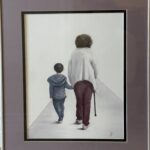 The New York Times Wordle word was CRONE the day I wrote this article. It took me five tries to figure it out, and since I didn’t know what it meant, I Googled it. The definition was short and not sweet: “An ugly old woman.” Ugh!
The New York Times Wordle word was CRONE the day I wrote this article. It took me five tries to figure it out, and since I didn’t know what it meant, I Googled it. The definition was short and not sweet: “An ugly old woman.” Ugh!
There is no such thing as an ugly old woman. I’ve never seen one, have you? I’ve seen many older women—I see one every morning when I brush the teeth I’m grateful to have.
Words like ugly depend on what your eyes see and how your mind thinks. The definition of ugly is unpleasant or repulsive, and I have used that word when describing someTHING but not someONE.
A person, young or old, might have what I would call ugly behavior or vocabulary, but to call any person ugly is inaccurate, wrong, and rude—just my opinion.
Aging involves a series of physical losses, including smooth full skin, eyebrows, shiny hair, balance, and strength. In exchange, we have wisdom, gratefulness, and a sparkle in our eyes. We speak fewer words, but what we say has more depth because our thoughts are the sum of knowledge based on experience. We laugh easier and care less about what other people think we should or shouldn’t be saying or doing. We have no control over their thoughts, so it’s hardly worth our limited energy.
The most significant loss as we get closer to the end of life is time, and it is silly to spend what time we have left on anything other than what brings joy to ourselves and others.
Shame on the people who originated and confirmed the meaning of crone. My words for older women are unique, fantastic, incredible, and beautiful. If I had to use only five letters, as in the Wordle game, my one word would be wiser, sweet, great, brave, funny, noble, smart, lucky, witty, and alive—never crone.
Thank you for “listening” to my rambling sparked by one little five-letter word. It’s proof our written and spoken language is powerful. Choose carefully what your eyes see and what your mind thinks because they add up to who you are, how you live, and the legacy you leave when your heart beats the last time.
powerful. Choose carefully what your eyes see and what your mind thinks because they add up to who you are, how you live, and the legacy you leave when your heart beats the last time.
Life is a gift; death happens to all of us, and words, even if unspoken, hurt or heal. You are the chooser.
Like Forest Gump said, “That’s all I have to say about that.” And when my aunt Opal, God bless her soul, would say, “There you go,” we all knew she had finished her story.
So, there you go, that’s all I have to say about that.
Until the next time: Live while you live.
Jennifer Goble, Ph.D., LPC, is the author of “My Clients…My Teachers,” and the blogger and writer of Rural Women Stories: www.ruralwomenstories.com.
Powered by WPeMatico